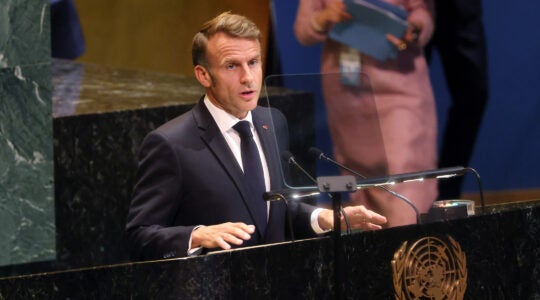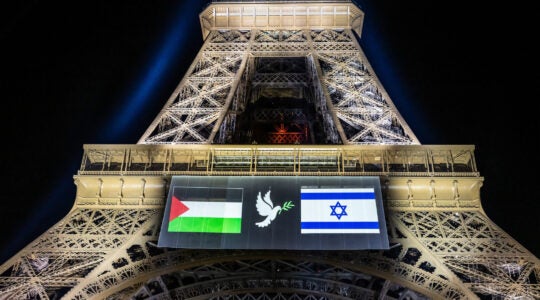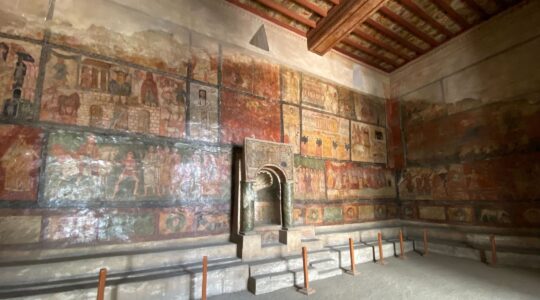(JTA) — Jewish leaders in Canada are debating a measure meant to prevent intolerance aimed at Muslims and other minorities.
Earlier this month, the head of B’nai Brith Canada outlined his objections to M-103, a parliamentary motion passed earlier this year that “condemns Islamophobia and all forms of systemic racism and religious discrimination.” The Standing Committee on Canadian Heritage held hearings on the measure this week.
Critics of the measure say it singles out Muslims for special treatment because it condemns only Islamophobia by name and does not explicitly mention other religious groups. Others have accused the motion of hampering free speech.
“Every Canadian Jew, along with every decent Canadian, recoils from the gruesome anti-Muslim crimes that we have seen in recent years, including the deadly January 2017 attack on a mosque in Quebec City,” B’nai Brith CEO Michael Mostyn wrote in an op-ed in the Canadian daily the National Post. “Still, many members of our community remain wary of M-103 and its possible implications — and justifiably so.”
Mostyn said in a statement that he would tell the Standing Committee on Canadian Heritage that by discouraging criticism of Islam, M-103 could make it harder to combat anti-Semitism.
Hate crimes on Muslims have more than doubled in the period between 2013 and 2016, according to Statistics Canada, a national agency. In 2015, the same agency found that in a trend that goes back at least nine years, Jews were the most targeted religious group for hate crimes.
Mostyn wrote that “many anti-Jewish incidents have been the handiwork of Canadian Muslims, sometimes even claiming to act or speak in the name of Islam. In the past 12 months, no fewer than four Canadian mosques — two in Montreal, and one each in Toronto and Vancouver — have been exposed as sites of vile anti-Jewish hatred.”
He referred to a mosque in British Columbia whose website included a link to anti-Semitic content and a 2016 sermon at a Toronto mosque in which the speaker spoke of the “filth of the Jews.”
Mostyn said that last month, Quebec prosecutors decided not to charge a Montreal imam, Sayed al-Ghitawi, who called on God to “destroy the accursed Jews,” to “kill them one by one” and “not to leave any one of them alive.”
“Imagine the outrage if a priest or pastor were caught on video making similar comments about Muslims at a Canadian church,” he wrote.
“Unfortunately, M-103 risks exacerbating the already lackadaisical public attitude toward these anti-Semitic outrages.”
Bernie Farber, former CEO of the Canadian Jewish Congress, expressed his support for the motion.
“As Canadian Jews we understand the need for memory,” he wrote in an op-ed in the daily Star. “With the legacy of Jewish suffering, it has become an article of faith to commemorate persecution. What we’re seeing here, sadly, is that when it comes to oppression of Canadian Muslims, there are too many attempts by too many Canadians to forget. M-103 is an attempt to resist this collective amnesia.”
The Centre for Israel and Jewish Affairs, or CIJA, in testimony Wednesday before the House of Commons Standing Committee on Canadian Heritage urged lawmakers to adopt precise language.
“We also believe it is crucial to achieve a reasonable consensus on key terms, including Islamophobia,” Shimon Koffler Fogel, CEO of CIJA, said in a statement. “One cannot effectively fight bigotry and hatred without precise definitions. We urge the committee to ensure that any definition provides maximal protection for Muslims from hate, without restricting legitimate discourse on political ideologies and activities.”
On Wednesday, Quebec legislators passed a religious neutrality bill that requires citizens to uncover their faces while giving and receiving state services, including riding public buses. The bill does not specifically identify articles of clothing, but appears to be targeting the Muslim burka and niqab.
Mira Sucharov, associate professor of political science at Carleton University in Ottawa, described the measure as “a legislated expression of Islamophobia.”
Canadian lawmakers are “threatening the delicate balance between religion and state in Canada while furthering Islamophobia through what is, effectively, a wide-ranging ban on the niqab and burqa,” she wrote in the Israeli newspaper Haaretz.
JTA has documented Jewish history in real-time for over a century. Keep our journalism strong by joining us in supporting independent, award-winning reporting.





